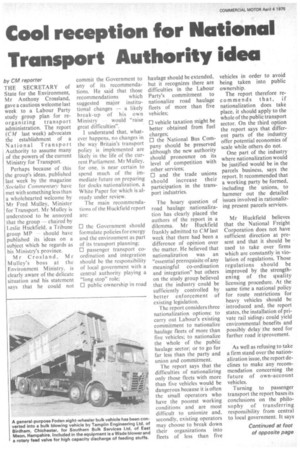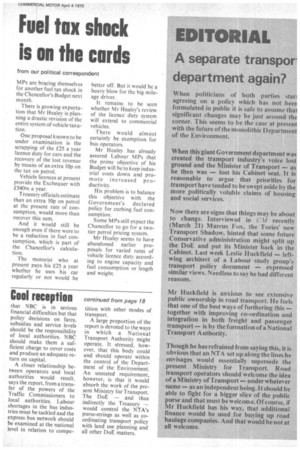Cool reception for National Transport Authority idea
Page 20

Page 21

If you've noticed an error in this article please click here to report it so we can fix it.
by CM reporter THE SECRETARY of State for the Environment, Mr Anthony Crossland, gave a cautious welcome last week to a Labour Party study group plan for reorganizing transport administration. The report (CAI last week) advocates the establishment of a National Transport Authority to assume many of the powers of the current Ministry for Transport.
Perhaps because of this the group's ideas, published last week by the magazine Socialist Commentary have met with something less than a wholehearted welcome by Mr Fred Mulley, Minister for Transport. Mr Mulley is understood to be annoyed that the group — chaired by Leslie Huckfield, a Tribune group MP -should have published its ideas on a subject which he regards as his Ministry's province.
Mr Crosland, Mr Mulley's boss at the Environment Ministry, is clearly aware of the delicate situation and his statement says that he could not commit the Government to any of its recommendations. He said that those recommendations which suggested major institutional changes -a likely break-up of his own Ministry would "raise great difficulties".
I understand that, whatever happens, no changes in the way Britain's transport policy is implemented are likely in the life of the current Parliament. M r M ulley, for one, is near certain to spend much of the immediate future on preparing for docks nationalization, a White Paper for which is already under review.
The main recommendations of the Huckfield report are: O the Government should formulate policies for energy and the environment as part of its transport planning; O passenger transport coordination and integration should be the responsibility of local government with a central authority playing a "long stop" role: D public ownership in road haulage should be extended, but it recognizes there are difficulties in the Labour Party's commitment to nationalize road haulage fleets of more than five vehicles; 0 vehicle taxation might be better obtained from fuel charges; • 0 the National Bus Company should be preserved although the new authority should pronounce on its level of competition with other services; 0 and the trade unions should increase their participation in the transport industries.
The hoary question of road haulage nationalization has clearly placed the authors of the report in a dilemma. Mr Huckfield frankly admitted to CM last week that there had been a difference of opinion over the matter. He believed that nationalization was an "essential prerequisite of any meaningful co-ordination and integration" but others on the study group believed that the industry could be sufficiently controlled by better enforcement of existing legislation.
The report considers three nationalization options: to carry out Labour's existing commitment to nationalize haulage fleets of more than five vehicles; to nationalize the whole of the public haulage sector; or to go for far less than the party and union and commitment.
The report says that the difficulties of nationalizing only those fleets with more than five vehicles would be dangerous because it is often the small operators who have the poorest working conditions and are most difficult to unionize and, secondly, existing operators may choose to break down their organizations into fleets of less than five vehicles in order to avoid being taken into public ownership.
The report therefore recommends that, if nationalization does take place, it should apply to the whole of the public transport sector. On the third option the report says that different parts of the industry offer potential economies of scale while others do not.
One part of the industry where nationalization would be justified would be in the parcels business, says the report. It recommended that a working party be formed, including the unions, to hammer out the detailed issues involved in rationalizing present parcels services.
Mr Huckfield believes that the National Freight Corporation does not have sufficient direction at present and that it should be used to take over firms which are constantly in violation of regulations. Those regulations should be improved by the strengthening of the quality licensing procedure. At the same time a national policy for route restrictions for heavy vehicles should be introduced and, the report states, the installation of private rail sidings could yield environmental benefits and possibly delay the need for further road it iprovement.
As well as refusing to take a firm stand over the nationalization issue, the report declines to make any recommendation concerning the future of own-account vehicles.
Turning to passenger transport the report bases its conclusions on the philosophy of transferring responsibility from central to local government. It says that NBC is in serious financial difficulties but that policy decisions on fares, subsidies and service levels should be the responsibility of local authorities. NBC should make them a sufficient charge to cover costs and produce an adequate return on capital.
A closer relationship between operators and local authorities would result, says the report, from a transfer of the powers of the Traffic Commissioners to local authorities. Labour shortages in the bus industries must be tackled and the express bus network should be examined at the national level in relation to compe
continued from page 18
tition with other modes of transport A large proportion of the report is devoted to the ways in which a National Transport Authority might operate. It stressed, however, that this body could and should operate within the control of the Department of the Environment. An unstated requirement, however, is that it would absorb the work of the present Ministry for Transport. The DoE — and thus indirectly the Treasury — would control the NTA's purse-strings as well as coordinating transport policy with land use planning and all other DoE matters.




































































































